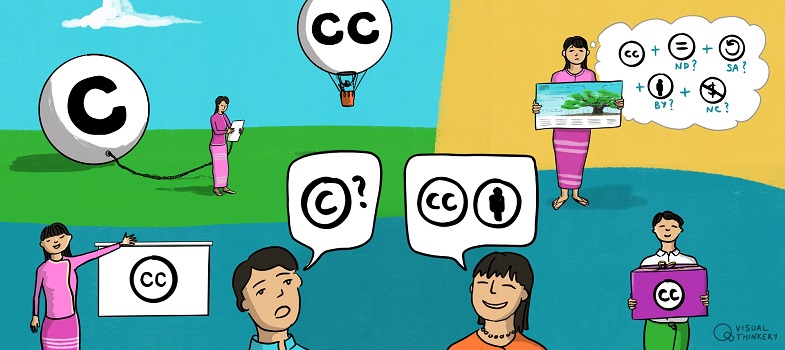Overview
Copyright law limits how people can use the original works of authors – or creators, as we often call them. Original works can be anything from novels and lyrics to cat videos and scribbles on a napkin.
Although copyright laws vary from country to country, there are certain commonalities among them globally. This is largely due to international treaties, which are explained in detail in Section 1.3.
There are some important fundamentals that you need to be aware of regarding what is copyrightable, as well as who controls the rights and can grant permission to reuse a copyrighted work.
Copyright grants a set of exclusive rights to creators or rights holders, which means that no one else can copy, distribute, perform, adapt or otherwise use the work in violation of those exclusive rights. This gives creators or rights holders the means to control the use of their works by others, thereby giving them an incentive to create new works in the first place. The person who controls the rights, however, may not always be the author. It is important to understand who controls the exclusive rights granted by copyright in order to understand who has authority to grant permissions to others to reuse the work:
- Work created in the course of your employment may be subject to differing degrees of employer ownership based on your jurisdiction. Australia, Japan, the United Kingdom and the United States adhere to some form of a doctrine commonly known as ‘work-for-hire’. This doctrine generally provides that if you have created a copyrightable work within the scope of your employment, the employer is the owner of, and controls, the economic rights in the copyrighted work – even though you are the author and may retain your moral rights [Tip: hold Ctrl and click a link to open it in a new tab. (Hide tip)] . (We will find out more about moral rights in Section 1.2.) This also applies in Myanmar under the new Copyright Act of 2019, unless otherwise agreed between the employee and employer.
- Teachers, learners or a university faculty may or may not own and control copyright in the works that they create in those capacities. That depends on certain laws (such as work-for-hire in some instances) and on the terms of the employment or contractor agreement, university or school policies, and terms of enrolment at the particular institution – even though they are the creators and may have moral rights.
- If you have co-created an original work that is subject to copyright, you may be a joint owner, not an exclusive owner, of the rights granted by copyright law. Joint ownership generally allows all owners to exercise the exclusive rights granted by law, but requires the owners to be accountable to one another for certain uses they make of their joint work.
- Publishers may own and control the copyright of work created anonymously or by individuals using pseudonyms – unless the author reveals their identity.
Ownership and control of rights afforded by copyright laws are complicated. For more information, please see the additional resources section.
- Copyright does not protect facts or ideas, only the expression of those facts or ideas. That may sound simple, but unfortunately it is not. The difference between an idea and the expression of that idea can be tricky, but it’s also extremely important to understand. While copyright law gives creators control over the expression of an idea, it does not allow the copyright holder to own or exclusively control the idea itself. For a deeper look at this issue, see the additional resources section.
- As a general rule, copyright is automatic the moment a work is fixed in a tangible medium. For example, in most countries you have a copyright as soon as you write the first line of a poem or record a song. In many countries registering your copyright with a local copyright authority allows you to officially record your authorship. This enables the creator to evidence copyright on a specific date: in some countries this may be necessary to enforce your rights or might provide you with certain other advantages. But generally speaking, you do not have to register your work to become a copyright holder.
- Copyright protection lasts a long time. You will find out more about this later, but for now it’s enough to know that copyright lasts a long time – often many decades after the creator dies.
Note that the combination of points 3 and 4 of this list – automatic entry into the copyright system and very long terms of copyright – has created a massive amount of so-called ‘orphan works’. These are copyrighted works for which the copyright holder is unknown or impossible to locate.
Reflection
Does your university or organisation have a strategy for collectively managing the resources created by everyone who works or studies there? Does your university have a policy regarding ownership of the resources you create while you are at work? Do you think it’s important to have a policy or strategy to support resource use and creation?
1.1 Copyright basics
